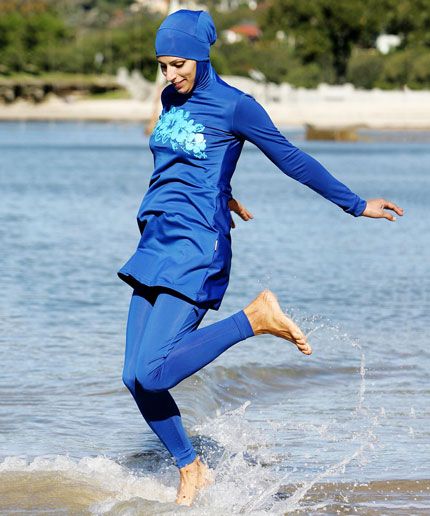Burkini Ban Met With Mixed Views
Homecoming Issue

Woman enjoys beach sporting a burkini in France.
October 21, 2016
The Burkini Ban in France was set in late July, 2016 by the Mayor of Cannes, France, David Lisnard. The “Burkini” swimsuit was banned across all of France’s public beaches, because it was said to be the “uniform of extreme Islamism.” A burkini is a swimsuit, commonly worn by a Muslim woman that covers the whole body from head to toe, only showing from their forehead to their chin, and revealing their hands and feet. The ban ties into the already existing French burqa ban. The burqa is a garment of clothing that covers a muslim women’s whole body, only revealing their eyes. The burqa was banned for security reasons, but should a swim-suit that protects a woman’s modesty be banned? The two main questions revolving around this issue are why France placed this ban, and whether or not it is acceptable for them to do so.
According to a BBC report, recent polls show that 64 percent of France’s public supported the burkini ban. Mike Gonzales, a senior at the Center for International Studies at the Heritage Foundation, commented, “France does not believe in multiculturalism,” suggesting that the French government would rather stick to their default racial, religious, and cultural groups, instead of accepting others. Another prevalent theory is that the French Revolution introduced a strong anti-religious notion that has kept religion from the public space. This idea is widely shown in France’s concept of laïcité, which is commonly used to defend bans targeting religious practices. According to The Economist, laïcité is a “strict form of secularism enshrined by law in 1905 after a struggle against authoritarian Catholicism.” Government officials in France view bans on religious wear such as burkinis as a way to preserve their secular values. A young French Muslim woman who resides in Marseille said that she was stopped by a group in a grocery store while shopping, after expressing her reason to wear a burkini on live television. The group told her, “You aren’t home here. Go home. This is fundamentalism.” This is a sign of the start of more widespread discrimination against Muslim women/people.
Although the majority of France agrees with the burkini ban, there are many individuals with different ideas. Many are also beginning to understand that the issue goes deeper than just the piece of swimwear; it connects to the Muslim religion as well. During an interview, Betsy Cepparulo, Global Peace and Justice Teacher, commented, “I think bans like this are a scared gut reaction that is misinformed. The world needs to know that there is a significant difference between Muslims and fundamentalist extremists who are committing acts of terror. It’s like comparing all Christians to the KKK.” In this quote, Betsy showed how easily the ban showed racism in the French government. By targeting an aspect of someone’s religion, even if it is as simple as a piece of clothing, it is a breach of their religion freedom. As a result of the more liberal nature of the US, many citizens in the US believe that everyone should be able to choose how they want to dress, and are shocked by the existence of the Burkini Ban. Lena Urick ’17 explained, “Regardless of religion, people should be able to wear what they’re most comfortable in on the beach, or anywhere else. Their country shouldn’t tell them what they can wear as what you wear is a personal choice, and I don’t really understand at all how the burkini was a safety risk to the people of France. However, I understand that France may have taken this precaution due to feelings of paranoia after the attacks in Paris.” It seemed that most of the people in France opinion’s were influenced by their government, which is not uncommon.
The burkini ban was so controversial that it was eventually lifted in many places in France. It seemed that many members of the Wilmington Friends School community were against the ban. Ruth Hazzard ’19 stated “I was confused when I first heard about this ban. I didn’t understand how France was even allowed to make a ban that so clearly violated muslim women’s religious freedom. Although the ban is clearly inappropriate, after digging deeper into the situation I understood the fear the French people had after the terrorist attacks earlier in the year.” Others in France were neutral on the situation and stated, “A bathing suit is just a bathing a suit.” Overall, the ban brought many mixed reactions. Some agreed that the ban was the right thing to do to protect the people of France’s safety, while others believed the opposite.






























